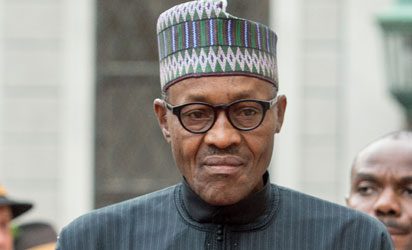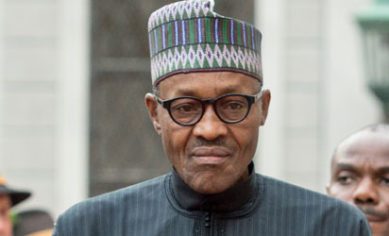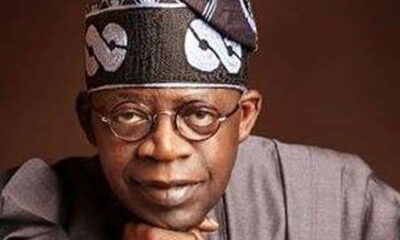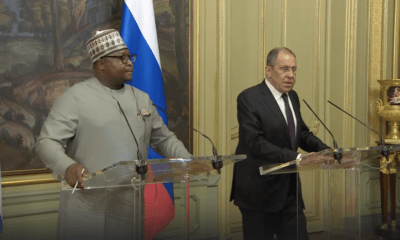National Issues
Saudi Arabia’s Islamic Military Coalition: Why Buhari’s Judgment Is Disturbing -By Adeolu Ademoyo

“Why can’t those Christians that complained go and fight terrorism in Nigeria or fight the militancy in the South. It’s Nigeria that matters, not the opinion of some religious bigots,” – President Muhammadu Buhari.

President Muhammadu Buhari
The unilateral decision of President Buhari to take Nigeria to ISMAT, and his claim that those who oppose his decision are (i) “religious”, (ii) “Christian” and (iii) “bigots” requires that we understand the president beyond the superficiality of his media construction by his crew.
This is because outside prepared speeches, President Buhari consistently betrays consciousness and positions that run contrary to the content of the prepared speeches he gives. A prepared speech is a great thing, however what one consistently says outside-prepared speeches is important for it may reveal one’s real self.
Hence, despite the bullying tactics of President Buhari, and those of his handlers, to silence the democratic opposition, it is legitimate for many reasons, to scrutinise his leadership beyond its media construction – one that does not seem to match up with his character as betraying a highly sectional consciousness under critical interrogation, and outside prepared speeches.
First, when faced with criticisms about the substance and result of the ‘Change’ programme he is spearheading, President Buhari and his advocates usually try to alter the conversation by shifting the focus from the president, claiming that “the people” are the drivers of change, who ought to see themselves as the centres of this.
Paradoxically, while President Buhari and his handlers maintain this position (which is part of what ought to be), yet he displaces the same “people” and their voice in the political process – an example being his unilateral decision in taking Nigeria into Saudi Arabia’s Islamic Military Alliance Against Terrorism (ISMAT). In other words, Buhari and his advocates choose when the fabled “the people” are the voice of change and when he, Buhari is the change!
Second, President Buhari is using the bullying weapon of the state to unilaterally resolve aspects of Nigeria’s burning “national question” in his own way, while denying or trying to avoid engaging the same national question and the need to consciously and systematically resolve it in an open, collective and deliberate manner by the people of Nigeria. This raises an ethical problem because you cannot be in denial of a thing and yet proceed to act within your own individual way on aspects of what you deny. The only way to resolve this is to claim that there are no moral scruples in public governance after wining an election!
Third, there is a spectre haunting the land, Nigeria presently, that “Buhari Can Do No Wrong”; and this is the spectre of a potential imperial presidency. In a democracy, and given our collective history and memory, this is real but dangerous to our collective being. This spectre encourages and arms President Buhari to, with complete ease and insensitivity, just keep mute on issues threatening the country, while giving the wrong impression of inaction; or to take decisions that are capable of undermining the unity of Nigeria. An example of this pertains to the current issue of Nigeria’s membership of ISMAT.
For the sake of the country, and to avoid a repetition of an imperial presidency with a parochial and sectional vision, as we had before, Nigerians need to stop this spectre before it grows beyond proportion. Before and during the 2015 elections, not a few Nigerians of the progressive and democratic hue were skeptical of the possibility of a democratic, nationalistic and non-sectional Buhari presidency. There were serious doubts that President Buhari would not be parochial and will be a democrat. These fears and skepticism are well documented, and recent trends in the polity seem to confirm these.
Some of the reasons why Nigerians oppose Nigeria’s membership of the coalition of Islamic states include:
(i) The theological and historical roots of religious motivated terrorism (this time of the Islamic type – although other religions have also deployed terrorism in the past and in the present) which can be traced to two sects in Islam and their custodians – Saudi Arabia (Salafi/Wahhabi-Sunni) and Iran (Shia). In a plural faith setting such as Nigeria, and globally, theological claims to “exceptionalism” and “authenticity” is problematic and can be the ground for bigotry and hate; and eventually terrorism. The roots and history of Al Qaeda, Taliban and ISIS (DAESH in Arabic language) and their Salafi/Wahhabi-Sunni ties illustrate this point;
(ii) A failure of the two custodians of these sects in Islam – Saudi Arabia and Iran to publicly disavow their sects’ theological and historical connection to the origins of terrorism. This is important because to defeat terrorism you must stop its oxygen;
(iii) The obvious global rivalry between Salafi/Wahhabi-Sunni Islam and Shia Islam, which is fed with mutual bigotry and, often, turns violent, involving physical harm and terrorism. In some cases, this leads to Sunni-on-Shiite violence/terror, and vice versa. In some countries, adherents of the Sunni sect use state weaponry and power towards overwhelming the Shiites;
(iv) The fact that the mutual global hatred and bigotry between Salafi/Wahhabi-Sunni Islam and Shia Islam has already spilled into Nigeria in both open and disguised forms;
(v) The plural nature of Nigerian Islam, which occurs alongside our diversity as a people, unlike the Saudi or Iranian exclusivist versions of Islam. To impose Salafi/Wahhabi-Sunni sectarianism on plural Nigerian Islam will certainly be problematic. And aligning with one of the custodians of Islam – Salafist/Wahhabist-Sunni Saudi Arabia can produce this.
(vi) To impose one sect of Islam on Nigerian’s diverse sects through stealth and covert means is a violation of what being Nigerian means. Our diversity and its critical acceptance is part of our Nigerian-ness. This particular factor in its articulated and unarticulated forms explain the almost instantaneous and articulated rejection of the Nigerian membership of ISMAT, which would import into Nigeria the unwanted Salafi/Wahhabi-Sunni and Shia anti-plurality and anti-diversity, in the name of a questionable claim to “authenticity”.
To deal a major blow to terrorism, you must stop its oxygen – the inherent sectarianism and fundamentalism in these Islamic sects. Saudi Arabia is not doing this. Iran is not doing this. This failure makes any apparent grandstanding against terrorism by these states suspect. Hence, the questions remain:
(a) Why is Saudi Arabia forming a coalition of Islamic states against terrorism when the inclination towards “authenticity” of the Saudi Arabia Salafi/Wahhabi-Sunni Islam is partly the seed of bigotry and eventually of terrorism? (b) Why can’t Saudi Arabia first attack the oxygen of terrorism, which is domiciled within its space, and its sect in Islam? (c) Why is Iran, the custodian of Shia sect and Saudi Arabia’s rival not in ISMAT? Does the absence of Iran not make ISMAT a mere political contraption? These are the critical concerns of Nigerians, which President Buhari never discussed before his unilateral decision to take Nigeria into ISMAT.
This is why President Buhari’s account of those who oppose his judgment and his flawed notion of “bigotry”, which distorts the facts about aspects of Nigerian life and history of battling Boko Haram, are worrisome.
The following can be derived from President Buhari’s claim as quoted above.
1. That those who oppose his unilateral decision are Christians. This is false;
2. Based on (1), it means those who support his unilateral decision are Muslims. This is false;
3. Based on (1) and (2), President Buhari is telling us that support and opposition to his unilateral decision is based on religious lines. This is false and it is disturbing, coming from a president, who many Nigerians from across all faiths and ethnic groups worked hard to get elected;
4. That Nigerian Christians have not been fighting Boko Haram terrorism. This patently false;
5. That there are no Nigerian soldiers who are Christians and who have been fighting Boko Haram terrorism. This is false;
6. That only Muslims have been fighting Boko Haram terrorism. This is patently false;
7. That only Nigerian soldiers who are Muslims have been fighting Boko Haram terrorism. This is false;
8. That Christians should fight the militants in the South. This is disturbing.
Interestingly, in his response to those who oppose the country’s membership of the ISMAT, President Buhari says it is “Nigeria that matters” (as if a mere phrase solves the issue, as if such phrase is sufficient to indicate a nationalist consciousness). The question is: Is “the Nigeria that matters” a sectarian, parochial and sectional Nigeria where a President takes a sectarian decision without regard to the unity of the country?
From the way he announced his decision, it seems President Buhari was carefully avoiding a conversation on an important issue in the life of the country, and in hurriedly calling those who oppose his decision names he unknowingly betrayed a sectional consciousness and a sectional worldview, hence confirming the fears many Nigerian democrats and progressives had about his sense of fairness and nationalism before and during the elections. His failure to disavow his previous claim on Boko Haram betrays him as hewn in the mould of a typical Nigerian politician whose position will shift on the basis of power and regional calculations.
This is an unfortunate question mark on President Buhari’s leadership, which his handlers will have to do a lot of work on.
President Buhari and his handlers need to know that there was Nigeria before President Buhari, and there will be Nigeria after him. Nigeria is bigger than any of us and any of her constituents – religious, ethnic, geographical, ideological, political.
The shortcomings of President Buhari and his handlers on this matter have shown that they need to learn this simple lesson and moral if they must retain the national consensus and national coalition (across all lines) that made the Buhari/Osinbajo ticket electable in the 2015 election.
Nigeria’s membership of ISMAT is a bad decision, and President Buhari’s targeting of a part of our country and their identity in his justification of the need to join ISMAT is disturbing. Hence, this membership is a poor judgment that needs to be reversed.
Adeolu Ademoyo, aaa54@cornell.edu, is with the Africana Studies and Research Center, Cornell University, Ithaca, NY.



















